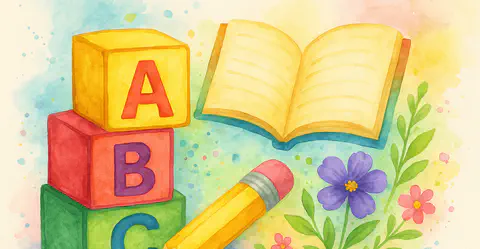Professional Grade 1 Readiness Assessment in Centurion & Middelburg
Transitioning into “school life” is a big move. Our comprehensive school readiness assessment helps you see whether your child is prepared for Grade 1, or whether they need a little more support before stepping into formal schooling.
As a child-focused Educational Psychologist in Centurion and Middelburg, I provide formal school readiness assessments (sometimes called Grade 1 readiness tests) that are accepted by schools and aligned with CAPS as well as other curricula (including IEB, Cambridge and various independent or homeschool programmes), to help parents and schools decide whether a child is ready to move from Grade 1 to Grade 1 or may benefit from an additional year.
What we look at
We assess in a natural, playful way:
- Cognitive skills: Basic reasoning, understanding sequences
- Language skills: Listening, speaking, early awareness of letters and sounds
- Motor skills: Fine motor (using scissors, holding a pencil) and gross motor (running, balance)
- Social and emotional readiness: Sharing, coping with frustration, interaction with peers
- Attention and behavior: Can they follow instructions, sustain focus for short tasks
We do all this in a fun, nonstressful session. Your child likely won’t even see it as a “test” - just games, toys, puzzles, and gentle conversation.
What you’ll receive
Afterwards, we give you:
- A friendly feedback session where we explain exactly which areas are solid and which could use support
- Practical ideas and tools you can do at home to strengthen any lagging areas
- Advice about starting Grade 1 now or giving your child an extra year to mature, if that turns out to be better for them
- A written summary you can share with the Grade R teacher or future school
- If needed, referrals for additional support like play therapy for emotional readiness or a more detailed psychoeducational assessment for older children
Why it matters
If your child is behind in one or more of these areas and starts Grade 1 anyway, they may struggle for years to catch up. This assessment gives you a chance to take remedial steps now, when it’s easier and more natural. Conversely, if they are ready, you’ll have confidence that they can step into Grade 1 without unnecessary worry.
Our approach
We run these assessments in friendly, safe spaces so your child feels at ease. You’ll see they’re not intense - they’re insightful. Because we know many schools around us in Gauteng and Mpumalanga, we also understand what local teachers expect.
Frequently Asked Questions
When should my child be assessed for school readiness?
Ideal timing is mid-year of their Grade R year (around June-August) if you’re uncertain about Grade 1 readiness for the following year. This gives you time to work on any gaps. Assessments can also be done earlier (age 5) if you’re considering early school entry.
What age should a child start Grade 1 in South Africa?
According to South African law, children must turn 6 by June 30th of their Grade 1 year. However, being legally old enough doesn’t always mean developmentally ready. Our assessment helps determine true readiness beyond just age.
How is this different from a psychoeducational assessment?
School readiness assessments are shorter, play-based, and focused specifically on Grade 1 preparedness (social, emotional, cognitive, language, motor skills). Psychoeducational assessments are more comprehensive, used for older children with suspected learning difficulties, and include formal IQ and academic testing. For high school students exploring future paths, see our career guidance services.
How long does the assessment take?
The assessment session typically lasts 1-1.5 hours and feels like playtime for your child. We then schedule a feedback meeting (30-45 minutes) about a week later to discuss results and recommendations with parents.
What if my child isn’t ready?
If your child needs more time, we’ll recommend either another year in Grade R or specific areas to work on at home (with practical activities you can do). An extra year can be the best gift you give your child, preventing years of struggle later. If emotional readiness is a concern, play therapy can help build confidence and social skills. We guide this decision with sensitivity and support.
How much does a school readiness assessment cost?
School readiness assessments includes the assessment session, written summary, and feedback meeting. Contact us for current pricing.
Will you provide a report for the school?
Yes. You’ll receive a written summary of your child’s developmental profile, strengths, areas needing support, and clear recommendations. You can share this with Grade R teachers or the receiving Grade 1 school.
What if the school disagrees with your recommendation?
Ultimately, schools make admission decisions, but our professional assessment carries significant weight. If there’s disagreement, we can communicate directly with the school and provide additional documentation. Most schools respect educational psychology input, especially when well-documented.
Do you assess children in both Centurion and Middelburg?
Yes. We offer school readiness assessments at both our Centurion (Gauteng) and Middelburg (Mpumalanga) locations. Contact us to book at your preferred location.
Curious about your child’s readiness? Contact us to set up a school readiness assessment in Centurion or Middelburg. Let’s help them step into school life confidently.
